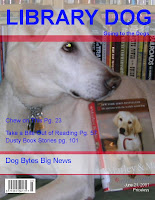
Reflecting on my learning journey: a few thoughts:
- What were your favorite discoveries or exercises on this learning journey?
I enjoyed learning how to create and maintain a blog. (All of this was new to me!) Of course, the "play" items were fun--I created a MEEZ and learned to upload photos and YouTube videos.
- How has this program assisted or affected your lifelong learning goals?
It has given me confidence that, yes, I can do techy things--even when they seem really hard. That confidence will give me encouragement to continue to use these 23 Things and to try more new things.
- Were there any take-aways or unexpected outcomes from this program that surprised you?
I was pleasantly surprised that I could accomplish the learning outcomes without becoming "lost" in the technology. Each new Thing came with its own challenges. I was always delighted when the Thing worked!
Another great outcome was the sense of camaraderie that our staff has felt in working through the Things together. There has been great sharing of ideas and tips and of basking in the glow of each other's successes. I think that it has provided a real sense of "community"--first with our branch staff, then also with CCPL staff -- and finally with staff members of other systems.
- What could we do differently to improve upon this program’s format or concept?
I think that if we had had even just a brief overview of what Learning 2.0 was all about before we started the program, it might have put us off to a better start. I really had no clue until about Thing 15 when I read the perspectives on Web 2.0 and Library 2.0. Then it all began to make sense. But, just like jumping into the lake and having to swim to survive--we all did jump right into this project. (CCPL is great about enthusiastically committing to a project!) I have not only survived, but have learned and grown immensely!!
- If we offered another discovery program like this in the future, would you again chose to participate? YES!
- How would you describe your learning experience in a few words or a few sentences, so we can share our successes and promote this program?
The process had many benefits. I learned about technology that I otherwise would not have. Many of the items that we learned were things that I didn't even know that I didn't know. (When I first looked at the list of topics we were going to learn about, it was like reading another language.) Another benefit was the collaboration that comes with social networking. The sharing of ideas and the ability to gain and distribute information has increased and will continue to increase. I am very appreciative that CCPL has encouraged all staff to be a part of this project.
CCPL is envisioning the future in libraries and preparing staff members to be a part of that future.
Thanks for this learning journey!




